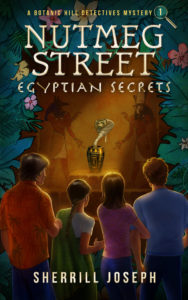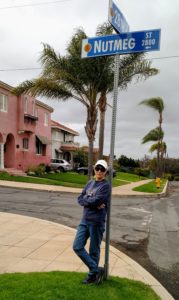Dear Readers and Loyal Newsletter Subscribers,
As we get closer to the release on FEBRUARY 1 of Nutmeg Street: Egyptian Secrets, Book 1 in my Botanic Hill Detectives Mysteries series, I will continue offering excerpts from the story.
Last time, I featured the conclusion of Chapter 1.
So get a clue, Readers. Please let me know what you think. And don’t forget to mark your calendars and purchase my book at Amazon.com in paperback and/or eBook on FEBRUARY 1.
But for now, sit back and hopefully enjoy the first half of Chapter 2:
Chapter 2 “Helpful Discussions”
Rani led the pack in the chase after the masked nut, her sari flapping behind her. After a few blocks, however, she was forced to stop. Her golden bangle bracelets glinted in the early afternoon sun as she wiped her brow with the back of her hand. Her friends soon caught up with her, panting for breath and unhappily conceding defeat. They hadn’t been speedy enough to catch the trespasser, who had a good head start on them.
Several blocks away, they watched the wiry, still-disguised runner jump into the driver’s seat of a parked blue sedan. The engine roared to life, and the car screeched down the street, leaving behind only thick tread marks.
“Whoever’s behind that mask is really fit,” said Rani, hunched over and sucking in oxygen.
Lexi bit her lower lip and narrowed her eyes. “That’s a great clue, Rani. Let’s hang onto it because it could help us identify the person. By the way, I’m impressed at how fast you can run in a sari.”
Rani replied, “My grandmother would kill me if she knew. The fabric’s very delicate. But more important, remind me to tell all of you later about mac ’n’ cheese. It might be another clue.”
“Huh? Mac ’n’ cheese?” Moki asked. He always tuned in when food was mentioned. “What’s that have to do with anything? Plus, you’re making me hungry.”
“I’ll tell you later. Might help us with our case,” she said with a mysterious smile, then sauntered back toward the house.
“Rani, sometimes I just don’t get you,” Moki called after her.
“Good. Mystery makes life interesting.”
The four retraced their steps to the big Craftsman-style house, and Lanny shared their bad luck with Mrs. Thornsley. “Not even a license plate number,” he said, jamming his knuckles into the palm of his hand with a loud pop. “I must be losing it.”
“No, bro,” Moki said, placing his hand on his best friend’s shoulder. “They lost it—or more likely, someone removed it. No back license plate. But at least we have a description of the car and some info about the person and the tires. That’ll be important to us and to the police.” Moki would know. His dad was a cop.
Moki called the Las Palmitas Police Department to report the crime on Mrs. Thornsley’s behalf. After hanging up he said, “According to the dispatcher, Dad’s out on a call having to do with the earthquake, but some other officers will be here very soon. Now, no worries, Mrs. T.”
The woman was pacing the floor like a caged tiger. “I just wish it was your dad coming instead. Oh, Moki, that’s silly of me. I realize he’s a busy man. It’s just . . . why are burglars and trespassers so interested in my house all of a sudden?”
“We’ll figure it out, Mrs. T,” Lexi replied. She and Rani exchanged glances. They both knew how much serious work was ahead of them.
Two officers arrived just minutes after Moki’s call, and Mrs. Thornsley breathed a sigh of relief. They took statements from all five witnesses about “Mask Face,” as Moki named the trespasser, and checked the small footprints Rani had found in the soil outside under the living room window. Lanny mentioned the shadow he had seen through the study doors, but nothing appeared disturbed on the leaf-covered ground. The officers said a squad car would cruise past the Thornsley house several times an hour for the next two days. After checking all around the property one more time, the officers left to investigate the tire marks and to question the neighbors.
“Keep all your doors and windows locked, Mrs. Thornsley, and look out the spy hole before opening the door,” one of the officers said gently.
“That’s always good advice,” the woman replied. “I’ll certainly do as you say.”
The kids made sure Mrs. Thornsley was feeling safe and composed before they left. “Don’t worry, Mrs. T. We’re on the job. We’ll keep you posted on our progress,” said Lanny. Lexi and Rani stood like bookends next to the woman.
“I know, Lanyon. Even though you’re only thirteen years old, you all have a way of instilling confidence in me. That’s why I hired you.” She led the kids to her huge front door, hugged each of them, waved good-bye, then lingered and watched them disappear up Nutmeg Street.
The squad was already mulling over their new case as the early afternoon sun warmed their faces. Finally, Rani said, “I don’t think it was an accident that the trespasser wore an Egyptian death mask.”
“Why do you say that?” Lanny asked, kicking a small stone off the sidewalk.
“It made an effective disguise, and an insensitive one at that, given what Mrs. T’s already been through. Whoever was behind that mask could be the same person who ransacked Dr. T’s study last month and returned today to continue the search.”
Moki looked at Rani and replied, “That means, if I’m following your thinking for a change, that whatever was being searched for in the study last month is still being searched for.”
“Exactly.”
Lanny stopped walking. “Maybe, or it could have just been a mean prank. As my hero, the great fictional detective Sherlock Holmes, would say, ‘Give me facts, not just suppositions.’ We do need theories, you guys, but we can’t suppose they’re true until we have proof. Proof comes from facts. That’s the scientific method of investigation, and so far, it’s worked well for us.”
Lanny was right. Boring, but right. Ever the voice of reason, an important quality in a detective. Each of the others had to admit it to themselves as they continued walking on in silence.
Soon, Moki disrupted the quiet. “Okay, so then, let’s get serious and scientific now and talk about mac ’n’ cheese. Rani, what’s up with that, and how can it be a clue in our case?”
“It’s simple. You see, I’m a synesthete,” she replied brightly.
“A synes-what?” Moki asked. Even Lanny, always ready with a definition, looked puzzled.
“A synesthete. I have synesthesia,” she said with a broad smile.
“Oh, now that clears everything up for me,” he smirked. “Is it fatal?”
Rani grimaced. “Uh, no, Moki, but I’ll explain. Synesthesia is a mixing of the senses, an extrasensory ability where one type of brain stimulation—let’s say, hearing a word or name—makes you experience something else. In my case, that something else is a taste or smell. Isn’t that cool?” She didn’t wait for an answer.
“Well, anyway, some synesthetes associate a word, number, or musical note with a color. Those are the most common types. I associate words and names with foods or aromas. My type of synesthesia is very rare. Four percent of the world’s population has some form of synesthesia. But less than one percent of the world’s population has my type. Lots of famous people have had synesthesia. Van Gogh, Duke Ellington, Plato, and Socrates all had it.”
“Wow!” Lexi said, then quickly frowned. “But we’ve been best friends for eight years. How come I’m only just learning this about you now?”
“I didn’t know I had it, let alone that there was a name for it. I read an article about it online recently. Then it was as if a lightbulb flashed in me. ‘Wow,’ I thought, ‘that’s me!’ I’d thought everybody associated names with food. I didn’t know it was a thing.”
“So synesthesia is an ability, not a disability?” Lanny asked looking steadily at the girl.
“Yes, and it’s automatic. I can’t turn it off, but I wouldn’t want to. It makes life more, well, delicious. Plus, it helps me remember names. And it’s like eating but without calories,” she beamed.
“So, the moment of truth. What do our names make you taste or smell?” Moki asked.
“Oh, Moki, your name makes me taste warm blueberry pie with melting vanilla ice cream.” She purposely emphasized the food words to make Moki hungry.
“Sweet. Of course,” he replied with crossed arms and a knowing smile directed at Lexi.
“Lexi, you’re crunchy, salty pretzels, the big heart-shaped kind. Lanny, you’re sweet potatoes mashed with butter, salt, and pepper. And my name, Rani, is raw green beans.”
“So, what’s with mac ’n’ cheese, and how can that help our case?” Moki asked.
“The word mask makes me taste mac ’n’ cheese. It might be interesting to see if that sensation occurs again during our mystery,” she replied.
They walked on to Rani’s house one block away on Oleander Street, discussing other names and food associations. Once at Rani’s, however, they knew they would turn to the serious business of hashing over their new case and formulating a plan of action for tomorrow. . . .
Come back next time for the conclusion of Chapter 2.

 Dear Readers,
Dear Readers,